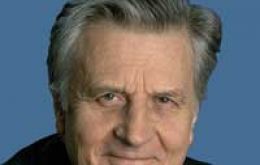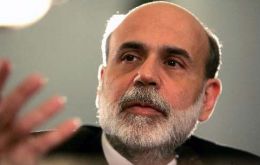MercoPress. South Atlantic News Agency
Economy
-
Thursday, March 6th 2008 - 21:00 UTC
Euro zone and UK leave interest rates unchanged

The European Central Bank (ECB) kept interest rates unchanged at 4% on Thursday as concerns about inflation persist. Earlier in London the Bank of England's Monetary Policy Committee adopted a similar decision keeping interest rates on hold at 5.25%.
-
Wednesday, March 5th 2008 - 21:00 UTC
Bernanke calls on bankers to prevent rise in foreclosures

The chairman of the US Federal Reserve, Ben Bernanke, has said more should be done to prevent homeowners facing foreclosures unnecessarily. Bernanke warned there had been a 50% rise in foreclosures in 2007 to one and a half million, and this is expected to worsen as mortgage repayments rise.
The Fed chairman told a meeting of US bankers that the situation called for a “vigorous response”. This would help communities and the wider economy, he said. -
Tuesday, March 4th 2008 - 21:00 UTC
US housing decline costs UK's main bank 17.2 billion dollars
HSBC, the UK's largest bank, has said it has made a 17.2 billion US dollar loss after the decline in the US housing market hit the value of its loans. However annual profits still rose 10% to 24.2 billion, up from 22.08 billion the year before.
-
Tuesday, March 4th 2008 - 21:00 UTC
US dollar in Chile looses 9.8%; 10 year low: 453 pesos

The US dollar marked its sixth consecutive fall and reached a new ten year minimum against the Chilean peso pushed by the interest rates differential between Chile and United States and the sustained growing price for copper.
-
Monday, March 3rd 2008 - 21:00 UTC
Mrs. Kirchner praises current Argentine economic model

Argentine President Cristina Fernández de Kirchner vowed on Saturday to sustain the current economic model which has spurred the greatest growth in a century and if this year confirms the current expansion rate, in Argentina's history.
-
Saturday, March 1st 2008 - 21:00 UTC
Magallanes Region has the lowest unemployment
Magallanes Region in the extreme south of Chile has the lowest unemployment in the country, 1.8%, according to the latest release from the country's Statistics Office, INE.
-
Saturday, March 1st 2008 - 21:00 UTC
US spending on food and fuel rises as dollar looses ground
United States consumer spending rose more than expected in January, but much of the gain was down to rising prices. The Commerce Department said on Friday personal spending rose 0.4% last month, a bigger rise than economists were expecting.
-
Saturday, March 1st 2008 - 21:00 UTC
Euro zone inflation marks an all time annual high in Jan

Hikes in fuel and heating oil prices pushed the Euro zone 12 months rate of inflation to an all-time high in January, but a sharper than expected drop in core inflation added weight to the view that it will fall back closer to the European Central Bank's 2% target ceiling later this year.
-
Friday, February 29th 2008 - 21:00 UTC
US Congress extends Andean countries trade preferences
The United States Senate voted Thursday to extend expiring trade preferences that allow Colombia, Peru, Ecuador and Bolivia to send most products to the U.S. duty-free. The ten month extension, through the end of 2008, was approved without objection.
-
Friday, February 29th 2008 - 21:00 UTC
Bad-news inflation as US economy sharp slowdown confirmed

United States economic growth fell sharply in the last three months of 2007 as the credit crunch took effect and spending on new housing slumped, revised figures released Thursday show.
